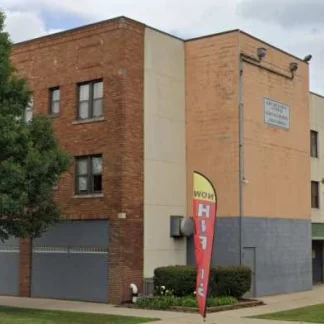VA Medical Center
VA Medical Center is a public rehab located in South Bend, Indiana. VA Medical C...
Life Treatment Centers, located in South Bend, Indiana, is a comprehensive drug and alcohol rehab for adults. They offer social detox, inpatient treatment, outpatient treatment, sober living, and aftercare.
Life Treatment Centers offers services that include gender-specific treatment and targeted programming for young adults, military personnel and Veterans, pregnant and postpartum women, women with young children, and intravenous drug users. They also provide treatment for co-occurring disorders.
The inpatient programs allow clients to focus on their recovery in a highly structured and supportive environment. Clients receive medical and mental health assessments, personalized care planning, and comprehensive case management. They also engage in intensive individual, group, and family counseling and recovery-focused life-skills training. Topics of focus include coping, self-care, and relapse prevention.
Their outpatient and aftercare services ensure a complete continuum of care aligned with clients’ evolving needs. These services may include step-down support, sober living transitions, employment and housing assistance, and referrals for medical, mental health, and social service programs.
Life Treatment Centers is CARF accredited and accepts private insurance, Medicaid, sliding-scale payment schedules, per-session payment, and self-pay. Financial aid is available.
Contact us for more information: (574) 233-5433

Connect with Life Treatment Centers by calling their admissions team directly.
(574) 233-5433 Website Get DirectionsThe Commission on Accreditation of Rehabilitation Facilities (CARF) is a non-profit organization that specifically accredits rehab organizations. Founded in 1966, CARF's, mission is to help service providers like rehab facilities maintain high standards of care.
CARF Accreditation: Yes Accreditation Number: 28584
Cognitive Behavioral Therapy (CBT) is a therapy modality that focuses on the relationship between one's thoughts, feelings, and behaviors. It is used to establish and allow for healthy responses to thoughts and feelings (instead of unhealthy responses, like using drugs or alcohol). CBT has been proven effective for recovering addicts of all kinds, and is used to strengthen a patient's own self-awareness and ability to self-regulate. CBT allows individuals to monitor their own emotional state, become more adept at communicating with others, and manage stress without needing to engage in substance abuse.
Group therapy is any therapeutic work that happens in a group (not one-on-one). There are a number of different group therapy modalities, including support groups, experiential therapy, psycho-education, and more. Group therapy involves treatment as well as processing interaction between group members.
Life skills trainings involve all the skills a person must have in order to function successfully in the world. These include time management, career guidance, money management, and effective communication. Truly successful addiction recovery is based on the ability to not only live substance-free, but to thrive. Life skills teaches the practical necessities of functioning in society, which sets clients up for success in life, and therefore sobriety.
Group therapy is any therapeutic work that happens in a group (not one-on-one). There are a number of different group therapy modalities, including support groups, experiential therapy, psycho-education, and more. Group therapy involves treatment as well as processing interaction between group members.
Life skills trainings involve all the skills a person must have in order to function successfully in the world. These include time management, career guidance, money management, and effective communication. Truly successful addiction recovery is based on the ability to not only live substance-free, but to thrive. Life skills teaches the practical necessities of functioning in society, which sets clients up for success in life, and therefore sobriety.
Life skills trainings involve all the skills a person must have in order to function successfully in the world. These include time management, career guidance, money management, and effective communication. Truly successful addiction recovery is based on the ability to not only live substance-free, but to thrive. Life skills teaches the practical necessities of functioning in society, which sets clients up for success in life, and therefore sobriety.
VA Medical Center is a public rehab located in South Bend, Indiana. VA Medical C...
Oxford House Liam is a non-profit house located in South Bend, IN. Oxford House ...
New Life Deliverance Center is a private rehab located in South Bend, Indiana. N...
Choices Recovery understands the urgency of providing effective treatment for th...